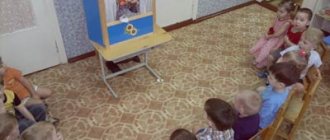Definition 1
Independent mathematical activity is work on the practical implementation of acquired mathematical knowledge and concepts during the educational process.
The knowledge acquired in mathematical classes, concepts and categories are transferred to the child’s activities.
The mathematical development of preschoolers is a necessary and conditioned direction of their overall development, implemented at the preschool stage of education.
Knowledge of the basics of mathematics and the formation of elementary mathematical concepts is necessary to prepare a child for school, develop the foundations of independence and lay the foundation for the formation of logical thinking.
All this determines the active development of independent mathematical activity of preschoolers, which deepens mathematical knowledge, makes mathematical concepts stronger and forms the desire of preschoolers to understand mathematical science.
Are you an expert in this subject area? We invite you to become the author of the Directory Working Conditions
Features of organizing independent mathematical activities of preschool children
Independent mathematical activity of preschoolers can have different contents and different directions. At the same time, it is characterized by its occurrence on the initiative of the child himself and its implementation without the participation of an adult.
The features of preschoolers’ implementation of independent mathematical activities are the following:
- Indirect participation of an adult: teacher or parent.
- A game form of implementing mathematical activities.
- Freedom for the child to choose the topic of the lesson, the features of its implementation, the period of implementation, etc.
- Creative approach to implementation of activities. Preschoolers find ways to perform specific mathematical operations, activating their creative thinking.
- Availability of performing actions used in the gaming mathematical process.
- Formation of skills in organizing, planning and implementing diverse types of activities.
- The child takes a subject position in this activity, i.e. he himself sets its goal, determines the content and methods of its implementation, and also sums up the results of the implementation of the activity.
Finished works on a similar topic
Course work Organization of independent mathematical activity of preschool children 410 ₽ Abstract Organization of independent mathematical activity of preschool children 270 ₽ Examination Organization of independent mathematical activity of preschool children 250 ₽
Receive completed work or specialist advice on your educational project Find out the cost
MAGAZINE Preschooler.RF
Methodological materials “Pedagogical conditions for organizing independent activities of preschool children”Bykova Lyudmila Anatolyevna, music director of MADOU DS No. 464
The Federal Law “On Education in the Russian Federation” dated December 29, 2012 N 273-FZ declares that preschool education is the first level of general education. Preschool education is aimed at the formation of a general culture, the development of physical, intellectual, moral, aesthetic and personal qualities, the formation of prerequisites for educational activities, the preservation and strengthening of the health of preschool children [13].
The educational program for preschool children (3 years - 8 years) should include a number of types of activities, such as gaming, including role-playing games, games with rules and other types of games, communicative (communication and interaction with adults and peers), cognitive research (studying objects in the surrounding world and experimenting with them), as well as the perception of fiction and folklore, self-service and basic household work (indoors and outdoors), construction from various materials, including construction sets, modules, paper, natural and other materials, visual (drawing, modeling, appliqué), musical (perception and understanding of the meaning of musical works, singing, musical-rhythmic movements, playing children's musical instruments) and motor (mastery of basic movements) forms of child activity. [13].
In accordance with the federal state educational standard for preschool education (hereinafter referred to as the Federal State Educational Standard for preschool education), pedagogical tasks must be solved by teachers:
- during regime moments
- in joint activities of children with a teacher
- in children's independent activities
- in joint activities with the family.
One of the main forms of organizing the educational process in a preschool educational institution is the independent activity of children. The study of the problem of independence of preschool children today is carried out in various aspects. The following are explored: the essence of independence, its nature (G. A. Ball, A. G. Khripkova); structure and relationship between the components of independence (Yu. N. Dmitrieva, G. N. Godina, T. G. Guskova); stages, conditions and methods of developing independence (Z.V. Eliseeva, N.S. Krivova, K.P. Kuzovkova); the meaning and role of independence as a factor of adaptation to a preschool institution
(T. N. Filyutina). Therefore, our chosen research topic is relevant.
Based on the relevance of the problem, we determined the purpose of the study: to theoretically study and practically test the pedagogical conditions for organizing independent activities of children in the senior group of preschool educational institutions.
Object of study: the process of organizing independent activities of preschool children.
Subject of research: pedagogical conditions that promote the organization of independent activities of older preschoolers.
Research hypothesis: the process of forming independent activity of preschoolers will probably be successful if the following pedagogical conditions are created:
- support by the teacher of children's initiative and independence;
- organization of a developing subject-spatial environment for the self-development of a child of senior preschool age;
- the use of independent search and research activities of children of senior preschool age in the educational process.
In accordance with the purpose, object, subject of the study, we identified the following tasks.
- To analyze the current state of the problem of organizing independent activity among preschool children in the psychological and pedagogical literature.
- To determine the pedagogical conditions that are necessary for organizing the independent activities of older preschoolers.
- To check the effectiveness of the identified pedagogical conditions in cognitive and research independent activities in children of the senior group of preschool educational institutions.
Structure of the work: the work consists of an introduction, 2 chapters (1 theoretical and 1 practical), conclusion, bibliography.
CHAPTER 1. THEORETICAL APPROACHES TO THE RESEARCH PROBLEM
1. 1. Modern approaches to organizing independent
activities of preschool children in pedagogical
theory and practice
In modern preschool pedagogy, the problem of organizing educational work in preschool institutions occupies a special place. Because today the question arises with all urgency about the need to design educational work focused on the principles of humanity, non-violence, subjectivity, integrity and integrativeness [ ].
It is the humane attitude towards the child as a subject of the educational process and the need to develop his internal potential in order to more successfully and less painfully undergo active socialization that are considered as leading trends at the present stage of development of preschool education.
Preschool didactics is based on the position that the full development of a child should be carried out in interesting, meaningful activities for him. Therefore, the teacher constructing the educational process needs to provide the child with the opportunity to engage in different types of children's activities, pedagogically competently coordinating and integrating them with each other.
Modern educational strategy orients preschool workers towards the purposeful design and construction of education based on the unity of the processes of socialization and individualization of the developing personality. The main requirement for organizing educational work is the affirmation of the child’s subjective position in the system of his life. In this regard, in the theory of preschool education, as well as in the practice of modern preschool institutions, it is a priori recognized that the process of teaching preschoolers is one of the most undeveloped and labor-intensive in educational work.
This is explained, firstly, by the fact that in the history of the formation and development of preschool pedagogy at various historical stages, diverse and often directly opposite methodological approaches prevailed and the most controversial author's concepts and theories of teaching preschoolers were proposed; secondly, the idea of practical workers that the education of preschoolers should be built on the basis of school didactics and approach the class-lesson, subject-informative model of teaching.
Independence - independence, freedom from external influences, coercion, from outside support and assistance. Independence - the ability to act independently, make judgments, have initiative, and determination. In pedagogy, this is one of the volitional spheres of the individual. This is the ability not to be influenced by various factors, to act on the basis of one’s views and motives. [eleven]
Independent activity is work that is performed without the direct participation of the teacher, but according to his instructions, at a time specially provided for this, while the child consciously strives to achieve the goal, using his efforts and expressing in one form or another the result of mental or physical (or both) actions.
According to the definition of A.I. In winter, independent activity is presented as purposeful, internally motivated, structured by the object itself in the totality of the actions performed and corrected by it according to the process and result of the activity. Its implementation requires a fairly high level of self-awareness, reflectivity, self-discipline, personal responsibility, and gives the child satisfaction as a process of self-improvement and self-knowledge.
Preschool age is the most critical stage of childhood. The high sensitivity of this age period determines the great potential for the child’s diversified development.
In the system of Friedrich Froebel (1782-1852), the main emphasis is on the activity of the child himself, on the need to motivate and organize his own activities. Therefore, in the upbringing of preschool children, the enormous educational and educational importance of the game is emphasized. The education of children in F. Froebel's kindergartens is based on a system of games with specific didactic material. Children's artistic activities occupy a large place in F. Froebel's system: drawing, modeling, appliqué, music and poetry.
Play in the forms in which it existed in preschool childhood is gradually being replaced by learning and work activities, the essence of which is that these types of activities, unlike games that simply provide pleasure, have a specific goal. Games during the learning process are of great interest to preschoolers. These are games that make you think, provide the child with the opportunity to test and develop his abilities, and include him in competitions with other children. The participation of preschoolers in such games contributes to their self-affirmation, develops perseverance, desire for success and various motivational qualities. In such games, thinking is improved, including actions of planning, forecasting, weighing the chances of success, and choosing alternatives.
The question of the nature and essence of the game worried and still continues to attract the attention of many researchers, such as: P.Ya. Galperin, V.L. Danilova, A.V. Zaporozhets, D.B. Elkonin. Different approaches to children's play are reflected in many works. Among these approaches, one can highlight the explanation of the nature of the essence of children's play, as a form of communication (M. I. Lisina), or as a form of activity, including the assimilation of adult activities (D. B. Elkonin) or as a manifestation and condition of mental development (F Piaget). Each of these approaches, while highlighting some aspect of the game, ultimately turns out to be insufficient to explain the essence and specifics of children's play as a whole.
L.S. Vygotsky noted that in preschool age, play and activities, play and work, form two main channels along which the activities of preschoolers flow. L.S. Vygotsky saw in play an inexhaustible source of personal development, a sphere defining the “zone of proximal development .
In the works of N.E. Veraksa says that one of the effective methods of working with children of senior preschool age when organizing independent activities is the method of project activity, which is based on understanding the role of the child’s personality in the preschool education system.
There are three main types of project activities: creative, research and normative - each of which has its own characteristics, structure and characteristic stages of implementation. Design is an important area of children's cognitive activity, which is not compensated by the development of other forms of activity in preschoolers. Project activities have a number of characteristics that have a positive impact on the development of a preschool child.
A.S. Mikerina points out in her dissertation research “Cognitive Development of Preschool Children” that the following types of projects are used in the practice of modern preschool organizations:
- research projects (they require a well-thought-out structure, are completely subordinated to the logic of the research, involve putting forward a hypothesis for solving the identified problem, developing ways to solve it, including experimental, experimental ones. Children experiment, conduct experiments, discuss the results obtained, draw conclusions, draw up the results of the research)
- creative projects (as a rule, these types of projects do not have a detailed structure of the joint activities of the participants; it is only outlined and further developed, subordinate to the genre of the final result, which can be formatted as a script for a video film, dramatization, holiday program, album. The presentation of the results can take place in the form of a holiday, video film, dramatization, sports game, entertainment)
- game (role-playing) projects (the structure of these projects is also just outlined and remains open until the work is completed. Children take on certain roles determined by the nature and content of the project. These can be literary characters or fictional heroes imitating social or business relationships, complicated by fictitious participants situations. For example, children enter into the image of characters in a fairy tale and solve the problem in their own way)
— information-practice-oriented projects (they are initially aimed at collecting information about some object, phenomenon; it is expected that project participants will become familiar with this information, analyze it and summarize the facts). Moreover, the result of the project is necessarily focused on the social interests of the participants themselves. Children collect information, discuss it and implement it, focusing on social interests; the results are presented in the form of stands, newspapers, and stained glass windows.
Cognitive and research activities of preschool children, in their fully developed form, presuppose the following:
- the child identifies and poses a problem that needs to be solved
- offers possible solutions
- tests these possible solutions based on data
- draws conclusions in accordance with the test results
- applies conclusions to new data
- makes generalizations.
Experimentation offers great opportunities for the cognitive development of preschool children. As HH Poddyakov proved, deprivation of the opportunity to experiment, constant restrictions on independent activity in early and preschool age lead to serious mental disorders that persist throughout life and negatively affect the intellectual and creative development of children and their ability to learn in the future.
Thus, we can conclude that the problem of organizing independent activities of preschoolers is presented in sufficient detail in the theory of preschool pedagogy.
| Next > |
Directions for implementing independent mathematical activities of preschoolers
Independent mathematical activities of preschoolers are implemented by preschool teachers in the following areas:
- Creation of a mathematical zone in a preschool educational institution. It is included in the subject-development environment and allows children to realize their mathematical abilities and imagination in independent activities. The components of such a zone are mathematical and logical games, materials for performing various mathematical operations: sticks, abacus, cubes, numbers, figures of various shapes, puzzles, Dienesh logic blocks, etc.
Figure 1. Creation of a subject-development environment. Author24 - online exchange of student work
- Organization of interaction with parents of students. It is aimed at creating a unified direction for the mathematical development of children, involving parents in the work of activating the mathematical interest of children, and implementing various types of mathematical activities at home. For this purpose, conversations are organized with parents, advisory sessions are held with them, mathematical events are organized with the involvement of parents, didactic games and exercises for parents are organized.
- Carrying out various forms of work with preschoolers to develop their creative abilities and independence skills.
All these areas make it possible to form mathematical concepts in preschoolers, which will become the basis of their independent activity, develop the need for knowledge of mathematical science and ensure the preparation of children for the start of school. At the same time, it is independent mathematical activity that directly depends on the forms and methods of mathematical teaching of children, the formation of elementary mathematical concepts in them.



